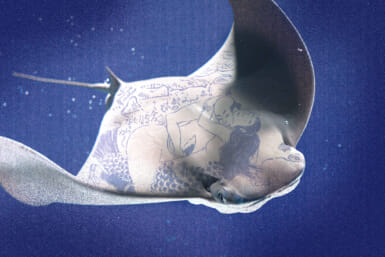Back after the summer break, musicians really hit the ground running in September. This year has been dominated by newer artists, yet last month reminded us that even accomplished musicians still got ‘it.’
We have crackling experimental electronic spookiness by Ultrademon through to punk jazz from Hei Tanaka plus foot-tapping city pop with YeYe and more. September’s top albums are a mishmash of genres, each one a standout in its own way.
No Buses — Home Sweet Home
Fresh from their appearance at Fuji Rock’s Red Marquee stage, indie five-piece No Buses released their third album Home Sweet Home to much acclaim.
The opener “In Peace” instantly hits like an indie version of a Red Hot Chili Peppers track with electronic cowbell before exploding into guitar fuzz. The second track, “Sunbeetle” is somewhat melancholy, bringing to mind the likes of Nick Cave, ending in an unfortunate shout which seems a little contrived.
“Daydream Believer” features guest vocals from producer and rapper, BIM, a welcome collaboration which buoys the track and hints at a new, interesting turn for the band. It may even help overcome the YouTube fame No Buses have spent ages trying to escape throughout their career. The album closes out uneventfully, leaving us wondering what direction the band will head with their next record. Will they continue with the originality as found in “Daydream Believer” and hinted at in “Sunbeetle”? Only time will tell.
Kentataku Yutataku — Zero On
Part of Sado Island’s Kodo Drummers, duo Kentataku Yutataku contributes to the inaugural release on the 0on label. At times a cacophony of percussion and restrained thunder, Zero On is a lesson in the importance of a balance between minimalism and maximalism. Thundering taiko superseded with rainsticks and shakers, one moment the album unleashes fury and the next it is lying awake listening to the rain.
Carefully composed and brilliantly executed, Zero On feels like witnessing a dramatic ritual.
Hei Tanaka — Archive 2
Hei Tanaka is a six-piece band fronted by Kaoru Tanaka, who is known predominantly for his stage and theatrical compositions. Yet perhaps it is Mitsukazu Tanaka’s mastering that lifts Archive 2 from good to great. Each instrument is clear, precise and assertive in its position, vocals included.
Listening with headphones in a cafe, I turned around as the drums from the opening track entered, checking to see if there was a band in the corner. Elsewhere, the maracas on “Blue Cheese” become a flourishing chef’s kiss moment. Tanaka’s expert mastering exemplifies parts that may have been missed otherwise.
The music itself is joyous and full of abandon. It’s a group of accomplished musicians having fun and they end up producing a record that blows others out of the water. Archive 2 is like happening on an open jazz night, in which the band playing happens to be very good and you feel like you definitely got your value for money that night.
YeYe — Hamidete!
The perfect songs for sunny Sunday mornings or lazy days, this album is a hark back to 1970s and 1980s Japanese city pop from the multi-instrumentalist. In addition to her band members, Hamidete sees her joined by collaborators including Ginger Root and BIM.
YeYe tends to switch between swayable and stripped-back, and Hamidete is gingerly the former, with consistent beats that encourage foot-taps and head-bobs. “Look Around” edges into synthesizer territory, with electro switchups brought back into YeYe style by cutting out into soft crooning. An easy-listener to pop on when friends come around for dinner.
Ultrademon — Aethi
Kyoto-based Ultrademon is a frequent performer in Tokyo, thanks to her unforgiving live and DJ sets. For anyone living and partying in the capital and beyond, she is unquestionably one to know. With this amount of activity, it can sometimes be easy to forget that she releases albums conventionally, such as her latest, Aethi. Ultrademon’s sets harness a fizzing energy from audiences, Aethi displays a similar amount of controlled constraint. A music artist with over a decade of experience, Aethi is Ultrademon showcasing her prowess.
“Lostgrace” shows elements of considered sound design, deliberately distorted vocals and a bass undertone that belies a monster beneath. Sure enough, halfway the vocals morph into a growl, with almost-shattering synths to hint at a kind heart of the beast.
Many of the songs on Aethi appear like a narrative. The album speeds through each track of noise, distortion and dark happenings, painting a personalized picture of an Ultrademon-imagined otherworld. Whether this is dystopia or utopia is not clear but one thing we know is that we’re keen to hear more.
KΣITO — Jakuzure Butoh
Out on Taiwanese artist, Tzusing’s Sea Cucumber label is the strikingly named Jakuzure Butoh, the newest album from Keito (stylized as KΣITO). A founding member of Tokyo GQOM, he has spent the past few years immersed in the genre, which is evident in his masterful take on its complex rhythms.
The opener, “Butoh” is a haze of unrelenting rhythm and pounding bass. Onto “Namako” and the synth evocatively ponders its next move, providing some (heavy) dancefloor relief before thundering into the next: “Lara.”
Each song continues in the vein of destroying the dancefloor through Keito’s own, heavily synthesized take on GQOM. Play it loud.
If you’re a Japan-based musician and are interested in featuring, please send any forthcoming releases over to editor[at]tokyoweekender[dot]com and include the subject line: “FAO Music Editor.”









